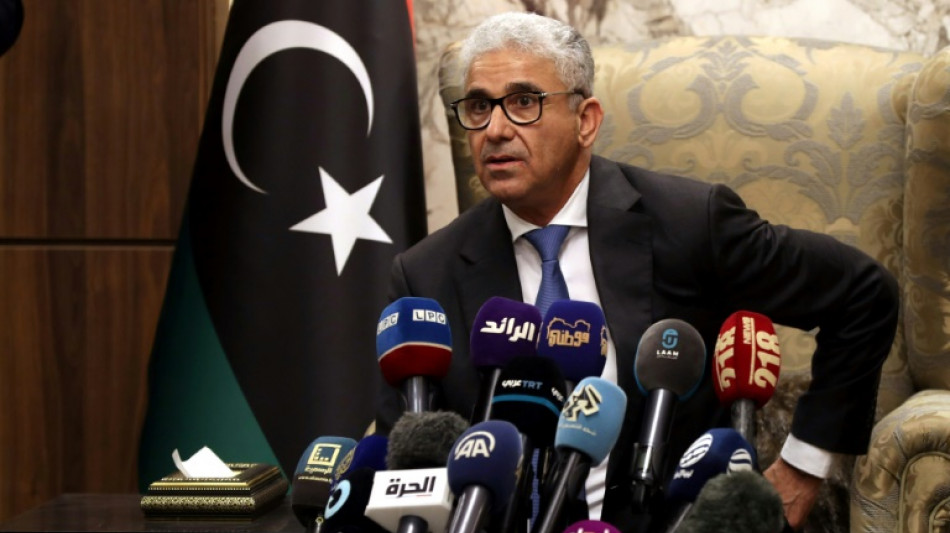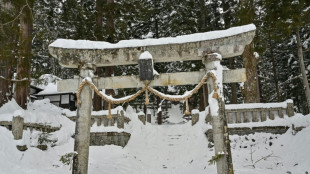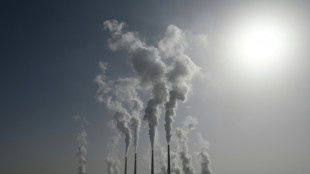
-
 Asian markets track Wall St loss; Frankfurt lifted by German vote
Asian markets track Wall St loss; Frankfurt lifted by German vote
-
Paedophile French surgeon on trial for abusing almost 300 patients

-
 Zelensky hails Ukraine's 'heroism' on third anniversary of Russia's invasion
Zelensky hails Ukraine's 'heroism' on third anniversary of Russia's invasion
-
In Ukraine, anticipating the 'next' war with Russia

-
 Macron to present Trump with 'proposals' on peace in Ukraine
Macron to present Trump with 'proposals' on peace in Ukraine
-
Zelensky hails Ukraine's 'heroism' on third annniversary of Russia's invasion

-
 Cavs hold off Grizzlies for seventh straight NBA win
Cavs hold off Grizzlies for seventh straight NBA win
-
China's Alibaba to invest $50 bn in AI, cloud computing

-
 Vatican thriller 'Conclave' wins top prize in SAG Awards upset
Vatican thriller 'Conclave' wins top prize in SAG Awards upset
-
Dominant Ducati unleash deposed MotoGP kings Marquez and Bagnaia

-
 Premier League champions-elect Liverpool leave mark on Man City
Premier League champions-elect Liverpool leave mark on Man City
-
Indonesia launches new multi-billion-dollar sovereign wealth fund

-
 South Korean fans soak up nostalgia with vintage Japanese superheroes
South Korean fans soak up nostalgia with vintage Japanese superheroes
-
Most Asian markets track Wall St loss; Hong Kong extends gains

-
 German vote winner Merz faces tough talks to build govt
German vote winner Merz faces tough talks to build govt
-
Japan warns of avalanches, icy roads ahead of more snow

-
 All Black Caleb Clarke admits dangerous driving: NZ media
All Black Caleb Clarke admits dangerous driving: NZ media
-
Debutants San Diego stun Galaxy with win in Los Angeles

-
 India's Modi uses mega Hindu festival to burnish credentials
India's Modi uses mega Hindu festival to burnish credentials
-
Surprise rebel alliance could give Sudan's beleaguered RSF a boost

-
 Three years after Russia invasion, UN faces difficult votes on Ukraine
Three years after Russia invasion, UN faces difficult votes on Ukraine
-
German 'rust belt' town spotlights growing appeal of the far right

-
 Campbell downs Potgieter in playoff for first PGA Tour title in Mexico
Campbell downs Potgieter in playoff for first PGA Tour title in Mexico
-
USA and Japan win to set up SheBelieves Cup decider

-
 Most USAID workers to be fired or placed on leave
Most USAID workers to be fired or placed on leave
-
Battery X Metals Highlights 2024 Achievements and Shares Vision for 2025

-
 Argo Blockchain PLC Announces Hosting Update
Argo Blockchain PLC Announces Hosting Update
-
Hemogenyx Pharmaceuticals PLC Announces First-in-Human Treatment with HG-CT-1

-
 Hakimi scores twice as PSG sink Lyon to stay unbeaten in Ligue 1
Hakimi scores twice as PSG sink Lyon to stay unbeaten in Ligue 1
-
Hat trick pulls Ovechkin closer to Gretzky's NHL goals record

-
 Tanaka strikes again as Japan down Colombia
Tanaka strikes again as Japan down Colombia
-
Baker wins US indoor 60m as Kessler, Hiltz complete double

-
 Kane admits last-minute decision to make Bayern bench
Kane admits last-minute decision to make Bayern bench
-
Bakers wins US indoor 60m as Kessler, Hiltz complete double

-
 American Airlines flight lands in Rome after 'security' issue
American Airlines flight lands in Rome after 'security' issue
-
Dupont eyeing Six Nations showdown with Ireland after Italy rout

-
 Slot wary of Premier League dangers despite 'big' Man City win
Slot wary of Premier League dangers despite 'big' Man City win
-
Borthwick defiant after uninspired England edge Scotland

-
 Nations at odds over major UN climate science report
Nations at odds over major UN climate science report
-
Pakistan fans look away from India Champions Trophy 'humiliation'

-
 Global prayers as Vatican says pope still 'critical'
Global prayers as Vatican says pope still 'critical'
-
Pakistan's Rizwan admits Champions Trophy dream 'ended' by India

-
 France star Dupont eyeing Six Nations showdown with Ireland after Italy destruction
France star Dupont eyeing Six Nations showdown with Ireland after Italy destruction
-
'We need another title', says Salah after 'special' Man City win

-
 Relentless Bayern stay eight points clear
Relentless Bayern stay eight points clear
-
Kohli shuts down 'noise' with landmark century

-
 Modric stunner maintains Real Madrid title charge
Modric stunner maintains Real Madrid title charge
-
Salah-inspired Liverpool beat Man City to open up 11-point Premier League lead

-
 Townsend wants England agony to inspire Scotland for Six Nations finish
Townsend wants England agony to inspire Scotland for Six Nations finish
-
Eleven-try France destroy Italy to set up Six Nations showdown with Ireland


Double trouble: Fears of violence over Libya's 2 PMs
Libyans found themselves with two prime ministers on Friday, raising the spectre of renewed violence in a country where elites have ignored the wishes of citizens to choose their leaders, analysts say.
After weeks of manoeuvering since December 24 elections were indefinitely postponed, the House of Representatives in the country's east on Thursday picked former interior minister and ex-fighter pilot Fathi Bashagha to replace interim prime minister Abdulhamid Dbeibah.
But Dbeibah, a construction tycoon appointed a year ago as part of United Nations-led peace efforts, has vowed only to hand power to an elected government.
Peter Millett, a former British ambassador to the country, told AFP the main division now "is between the Libyan people -- who want elections -- and the political elite, who don't."
He noted that more than two million Libyans, out of a total population of seven million, had collected voter cards last year, showing a desire to pick new representatives in December when both legislative and presidential polls were supposed to be held.
"The motivation of many MPs is to hang on to jobs and privileges rather than allow for a smooth process leading to elections," Millett said.
It's not the first time the oil-rich North African country has found itself with two premiers.
Torn apart by a decade of strife since a 2011 NATO-backed uprising that toppled dictator Moamer Kadhafi, Libya had two rival heads of government between 2014 and 2016.
The UN has been working to reunite the country's divided institutions since the end of the last major fighting in 2020, but many analysts have accused the entrenched political elite of blocking reconciliation efforts.
- Militias -
The country's infrastructure is ruined and its economy battered, meaning that for normal Libyans, the stakes couldn't be higher.
"The cost of living is obscene," said Abdul Mawla al-Kaseh, a resident of Shahat in northeastern Libya.
Salem Bakkar, also from Shahat, said it doesn't matter who heads the government as long as they "stress the importance of reconciliation and urge the holding of elections."
Libya has seen months of relative stability since a landmark October 2020 ceasefire which formally ended eastern military chief Khalifa Haftar's bid to seize by force the capital Tripoli in the west.
But a patchwork of local militias, with foreign backing and linked to political figures, continue to vie for control.
Dbeibah and his unity government were appointed with a mandate to steer the country to the polls, which were eventually derailed by differences over their legal basis and contentious candidates.
That left question marks over the UN's roadmap.
The eastern-led parliament -- whose own mandate ended in 2015 -- argued that Dbeibah's administration was past its sell-by date, and stepped up efforts to remove him.
With Bashagha now challenging his power, backed by Haftar's forces, some analysts fear a return to conflict.
Yet that could look very different from the previous rounds of violence fuelled by the country's geographic divisions.
"There really isn't an East-West division as there was a year ago," said Amanda Kadlec, a former member of the UN panel of experts on Libya.
"What is potentially dangerous is violence in Tripoli, as Bashagha and Dbeibah both have deep connections across western Libya," she added.
Millett also warned of "potential instability in Tripoli" and said: "The international community should aim for a clear and transparent, process that sets out a clear roadmap to elections."
- 'A lot can happen' -
The UN said Thursday it still recognised Dbeibah's administration.
But on the ground, the delicate balance of power could easily shift, Kadlec said.
"The militias will move with whomever they perceive as having power," she said.
Kadlec added that armed groups backing Dbeibah could easily shift behind Bashagha, providing he is "willing to give them positions in government, keep paying their salaries and giving them weapons".
Claudia Gazzini, senior Libya analyst with the International Crisis Group, wrote on Twitter that the parliament was set to hold a vote of confidence on Bashagha's proposed cabinet two weeks from now.
"As recent events in Libya showed us, a lot can happen in two weeks," she said.
Just hours before the parliamentary vote to replace him, gunmen in Tripoli fired on Dbeibah's convoy in Tripoli.
The interior ministry said nobody was hurt -- but there are fears it could be the opening volley of another ruinous battle.
C.Garcia--AMWN